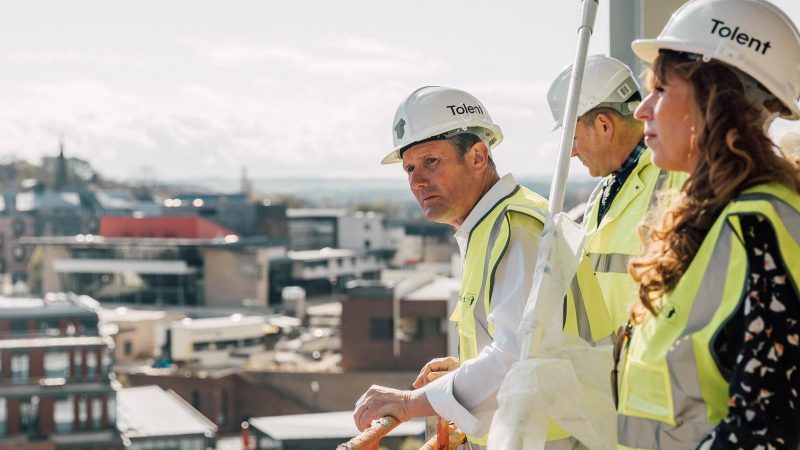
“It’s not 1997 anymore,” was a phrase regularly heard by those of us who have spent much of the time since 2010 arguing for Labour to return to its roots as a centre-left party of power and reform, as opposed to the rainbow alliance of anti-capitalists, cranks and Israel obsessives it ever more resembled as we approached the 2019 election.
Today it might seem people like me have won the argument: Labour has certainly abandoned the idea that slogans substitute for compelling argument and a vision.
In reality, though, we do have to move beyond the mindset of 1997 and the government that followed.
The last Labour government lost the argument on public spending
In that year we elected a Labour government committed to the thorough renewal of the public sphere.
For more than a decade it was true to its task and, even when the economic weather turned to a hurricane-force storm after 2008, public services were preserved and protected. Austerity and public decay are the responsibility of the Tories and no-one else.
But we must also be honest with ourselves about how the argument went.
Debate in the 2010 election turned on just how much to spend on public goods and, whether we like it or not, the Tories (and their Lib Dem allies) won the intellectual contest and used fear of Labour as the party of the public-sector-above-all to win again in 2015.
The denigration of our record in office by people who should have known better did not help but that is an argument for another time.
Labour seeks to govern in difficult economic times
Winning back trust has not been easy but it is clear the leadership are determined to do so. Discipline on spending announcements is fierce and the Treasury team firm.
It is going to be far tougher than 1997 when Keir Starmer walks across the threshold of Downing Street sometime in 2024.
The state of the economy after the failed Tory experiment is dire. There is just no way that the coming Labour administration can hope to be a repeat of the 1997 – 2010 experience of more-or-less continuous growth in public spending. Priorities will have to be set and stuck to as there will little sign of the rising tide needed to lift all boats.
With the tax burden under the Tories at a record peacetime high there will be little room for movement there either. There is a reason that pledges to huge increase public spending through taxes that only hit the rich are not seen as credible by many voters: experience.
Voters don’t want increased prices or taxes
Households are being squeezed hard by rising prices on one hand and rising Tory taxes on the other. They are not going to vote Labour to make either worse.
Instead, the next Labour government is going to need to focus heavily on getting the private sector to grow and that means companies that make money, reward shareholders for their financial backing and invest for the future.
That means too, that the next Labour government needs to reverse the precipitous decline in the London’s capital markets and instead see this country look less like a failed experiment in creating a tax haven and more like a solid base for innovation and investment.
This isn’t about taking money from workers and handing it to shareholders. Well paid private sector jobs are what we need to aim for but they only come with private sector success.
Does owing more to Methodism than to Marxism hold us back?
Unlike the continent’s social democrats, Labour has never been a Marxist party (it wasn’t one under Corbyn either): that was a strength in the 1940s and 1950s but today can often feels like a weakness.
Never being Marxist in the first place also means never having to construct a thorough understanding of, and from that an intellectual repudiation of Marxist ideas.
If the simplistic slogans that attract many about the wickedness of profit and the evils of capital owe as much to Methodism as Marx, they are still a barrier to winning power and changing the world.
Put simply when we do this we talk in a language distant from the everyday experience of working people who rely on their employers’ making a profit to fund their next pay raise or promotion.
This is not about refusing to challenge things like share buy backs or the sort of gouging that has taken Thames Water to the brink. Just because it makes money for someone in the City does not mean it is a good or worthwhile activity.
We need to talk more about private successes
But nor should we fall for the arguments that put wage rises and dividend payments at opposite ends of the board or impute unmerited virtue for public corporations simply because of their ownership.
Instead, Labour’s campaigners should talk more and more often about private sector success and the importance of strong businesses. After all that is where the bulk of working people actually earn their pay, not some alien space which Labour must avoid.
Rebuilding after the Tories is going to take time – a lot of time. A successful private sector of the first term – building houses, investing in technology and jobs, paying good wages, competing for global trade and, yes, making a healthy profit is going to be essential for our long-term success.




More from LabourList
‘A case for hope amid hard times’
Eluned Morgan splits with Sarwar and backs Prime Minister
‘Putting our values into action: Labour should make social security work for everyone who needs it’